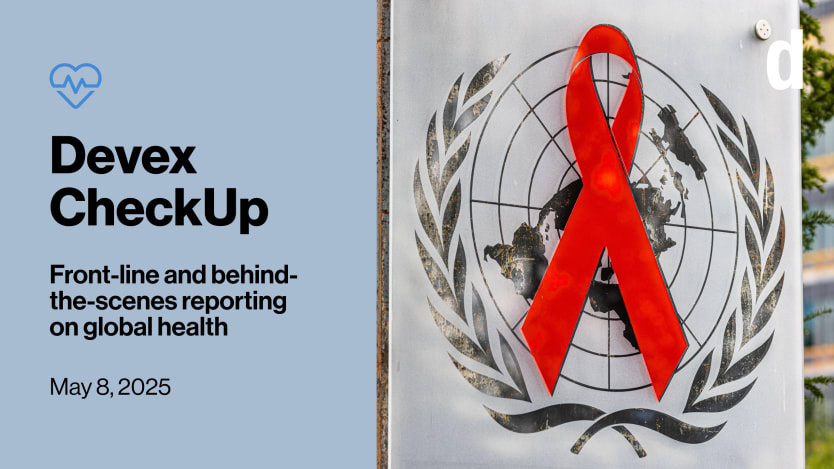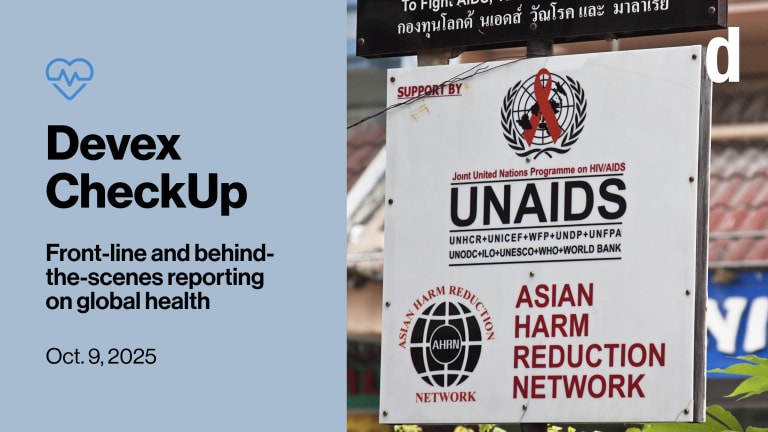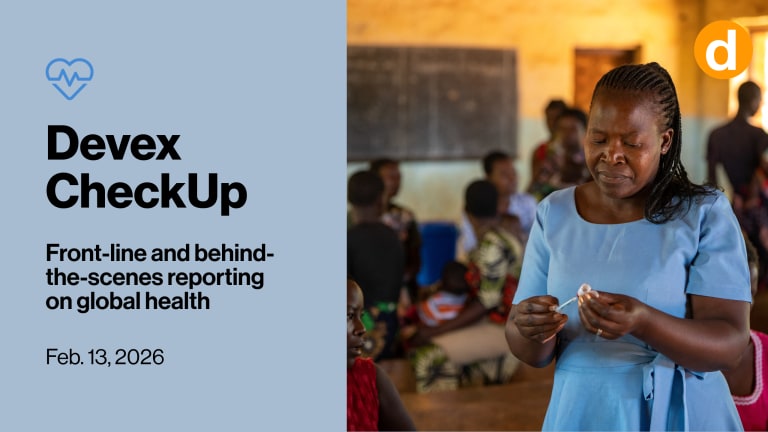
UNAIDS is about to get a lot smaller.
As a result of the global health funding crisis, the agency is set to let go of more than half of its full-time staff, shrinking from 608 to about 280 positions, according to a communiqué seen by Devex. The organization has promised that no staff member living with HIV will lose their job.
The cuts don’t stop there. UNAIDS will also close offices in 39 countries, reducing its presence to 36 — although some of those offices will serve multiple nations.
These changes will start to take effect by the middle of this month.
The abruptness of this decision has a lot of the agency’s allies worried, not least over concerns about what this will mean for the future of the global AIDS response. And one official from a UNAIDS cosponsoring organization warned that the changes laid out in the communiqué are being enacted with little coordination.
“What’s really disturbing is that this hasn’t been done in a planned way with cosponsors so that we ensure [continued] support at the country level,” they tell my colleague Jenny Lei Ravelo.
UNAIDS says it is working within a restructuring process guided by recommendations from a high-level panel convened last year. That panel recommended the joint program operate until 2030, but with a smaller secretariat and fewer cosponsors.
It seems likely, though, that the current funding crisis has probably accelerated whatever plans UNAIDS had for implementing those recommendations.
Exclusive: UNAIDS will lose more than 50% of staff in restructuring
Problem solving
When a woman is about to give birth in Africa, families often have to make a choice: pay to cover any medical complications for the mother or child or buy food. That’s because many health services are not fully covered by health systems and programs run by nongovernmental organizations to assist mothers and children are now shrinking.
That adds up to a tragic reality where around 178,000 mothers in Africa die from complications related to childbirth, and 1 million newborns die in the region each year.
To try to relieve families from having to make these decisions, GiveDirectly is testing a model of giving money directly to households. They have pilot programs currently operating in the Democratic Republic of Congo and Malawi, and the results are looking promising — if anecdotal.
In the DRC, mothers say they are using the money — $1,370 per household for two years — to buy nutritious food and to settle hospital bills. In Malawi, GiveDirectly is working with Save the Children to test several different models, with a specific focus on improving nutrition outcomes.
Read: Is unconditional cash the missing link in maternal and child survival?
+ Devex Pro members can also read this article in which GiveDirectly’s Rory Stewart shares why cash is “the most radical form of localization.” Not yet a Devex Pro member? Start your 15-day free trial today to access the piece plus all our expert analyses, insider insights, funding data, events, and more.
Prescription only
Malawi has a urinary tract infection crisis.
A recent study found that nearly half of the UTIs diagnosed in the country are resistant to first-line treatments. And the most vulnerable are on the front lines of this problem, particularly poor women and girls between the ages of 15 and 45.
If standard, affordable antibiotics cannot resolve the UTI, there are concerns about how these patients will be able to access and afford the more expensive second-line treatments.
This UTI crisis in Malawi is one of the results of the unchecked use of antibiotics. There is widespread purchasing of antibiotics without the guidance of health workers. That can accelerate antimicrobial resistance, which takes the form of problems such as drug-resistant UTIs.
Resolving Malawi’s crisis is going to take more than expensive treatments. It means encouraging people to use only prescribed antibiotics but also working with women and girls to better manage UTIs and to improve hygiene and sexual health education.
Read: How unregulated antibiotics are fueling drug-resistant UTIs
Show me the data!
For Dr. Atul Gawande, data is fundamental for understanding and addressing global health challenges. And during his time as the U.S. Agency for International Development assistant administrator for global health, he relied on it to guide his decisions.
“Our goal was to reduce the percentage of deaths that occurred before the age of 50 in any given country. And my questions were always: What’s the most important? What’s the data on what kills people and where we can make that difference?” he said during a conversation on global health at Harvard University this week.
He applied that approach in places such as Ukraine. Confronted with multiple health crises, he instructed his team to first ensure the hospitals functioned before addressing specific challenges such as preventing the spread of tuberculosis and polio.
This is why he is concerned about the Trump administration’s decision to gut funding for critical data collection mechanisms, such as the Demographic and Health Survey, which many countries and organizations rely on. Without the data, experts fear countries will find it difficult to understand their populations’ health needs and to target their investments.
Gawande said he’s worked with the DHS team to identify a philanthropic funder, while lobbying the U.S. Congress to get funding flowing back to the program.
ICYMI: Critical global surveys fall casualty to US foreign aid gutting
CheckUp in Geneva
Your next job?
Senior Regional Medical Data and Reporting Assistant
International Organization for Migration
Nairobi, Kenya
Want to meet the reporters behind this newsletter? If you’re in Geneva for the upcoming World Health Assembly, you’ll have a chance! We’re hosting a journalist-led summit on May 22. It’s a full-day event, where we’ll be discussing some of the most pressing issues in global health.
Questions about the future of global health funding are at the top of that list. I’ll be moderating a panel with representatives from the Global Fund to Fight AIDS, Tuberculosis and Malaria, the Pandemic Fund, and others to dive into how organizations can respond to a shrinking pie.
I’m also excited to talk to community representatives about how to ensure their priorities are maintained in whatever funding landscape emerges and to think through what role emerging technology is going to play in all of this.
In addition to our summit, we are hosting a series of events and roundtables with partners on May 19-22. I’m hoping you’ll request an invite to join us in Geneva or register to watch online.
+ Check out other upcoming Devex events: On May 12, we’ll host a discussion on what’s next for European aid. Register here for that. We’ll also have a conversation on May 14 with Mulago Foundation CEO Kevin Starr, who will offer candid insights into the future of aid. Save your spot.
What we’re reading
The U.S. National Institutes of Health will no longer renew or issue “foreign subawards,” a system for funding collaborations between American and foreign institutions. NIH says another award structure will be introduced, though it did not offer any additional details. [Nature]
As the United States cuts research funding, the European Union has pledged $568 million in new funding over the next two years, while pledging to respect academic freedom, to try to draw scientists to the continent. [Science]
A series of bombings in northern South Sudan killed seven people and injured at least 20 more, while also destroying a Médecins Sans Frontières pharmacy and damaging the NGO’s hospital, which is the only one in the region. [Democracy Now]








